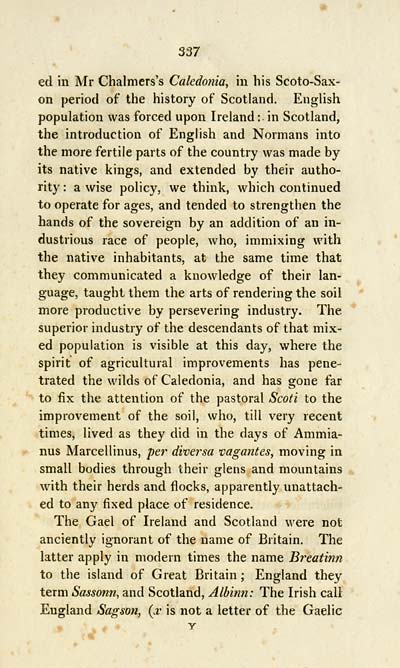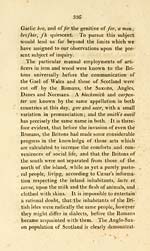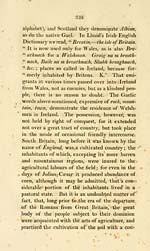Download files
Complete book:
Individual page:
Thumbnail gallery: Grid view | List view

337
ed in Mr Chalmers's Caledonia, in his Scoto-Sax-
on period of the history of Scotland. English
population was forced upon Ireland : in Scotland,
the introduction of English and Normans into
the more fertile parts of the country was made by
its native kings, and extended by their autho-
rity : a wise policy, we think, which continued
to operate for ages, and tended to strengthen the
hands of the sovereign by an addition of an in-
dustrious race of people, who, immixing with
the native inhabitants, at the same time that
they communicated a knowledge of their lan-
guage, taught them the arts of rendering the soil
more productive by persevering industry. The
superior industry of the descendants of that mix-
ed population is visible at this day, where the
spirit of agricultural improvements has pene-
trated the wilds of Caledonia, and has gone far
to fix the attention of the pastoral Scoti to the
improvement of the soil, who, till very recent
times, lived as they did in the days of Ammia-
nus Marcellinus, ^er diversa vagafites, moving in
small bodies through their glens and mountains
with their herds and flocks, apparently unattach-
ed to any fixed place of residence.
The Gael of Ireland and Scotland were not
anciently ignorant of the name of Britain, The
latter apply in modern times the name Breatinn
to the island of Great Britain ; England they
term Sassonn, and Scotland, Albinn: The Irish call
England Sagson, (.v is not a letter of the Gaelic
Y
ed in Mr Chalmers's Caledonia, in his Scoto-Sax-
on period of the history of Scotland. English
population was forced upon Ireland : in Scotland,
the introduction of English and Normans into
the more fertile parts of the country was made by
its native kings, and extended by their autho-
rity : a wise policy, we think, which continued
to operate for ages, and tended to strengthen the
hands of the sovereign by an addition of an in-
dustrious race of people, who, immixing with
the native inhabitants, at the same time that
they communicated a knowledge of their lan-
guage, taught them the arts of rendering the soil
more productive by persevering industry. The
superior industry of the descendants of that mix-
ed population is visible at this day, where the
spirit of agricultural improvements has pene-
trated the wilds of Caledonia, and has gone far
to fix the attention of the pastoral Scoti to the
improvement of the soil, who, till very recent
times, lived as they did in the days of Ammia-
nus Marcellinus, ^er diversa vagafites, moving in
small bodies through their glens and mountains
with their herds and flocks, apparently unattach-
ed to any fixed place of residence.
The Gael of Ireland and Scotland were not
anciently ignorant of the name of Britain, The
latter apply in modern times the name Breatinn
to the island of Great Britain ; England they
term Sassonn, and Scotland, Albinn: The Irish call
England Sagson, (.v is not a letter of the Gaelic
Y
Set display mode to: Large image | Transcription
Images and transcriptions on this page, including medium image downloads, may be used under the Creative Commons Attribution 4.0 International Licence unless otherwise stated. ![]()
| Early Gaelic Book Collections > Ossian Collection > Thoughts on the origin and descent of the Gael > (349) |
|---|
| Permanent URL | https://digital.nls.uk/82238632 |
|---|
| Description | Selected books from the Ossian Collection of 327 volumes, originally assembled by J. Norman Methven of Perth. Different editions and translations of James MacPherson's epic poem 'Ossian', some with a map of the 'Kingdom of Connor'. Also secondary material relating to Ossianic poetry and the Ossian controversy. |
|---|
| Description | Selected items from five 'Special and Named Printed Collections'. Includes books in Gaelic and other Celtic languages, works about the Gaels, their languages, literature, culture and history. |
|---|

